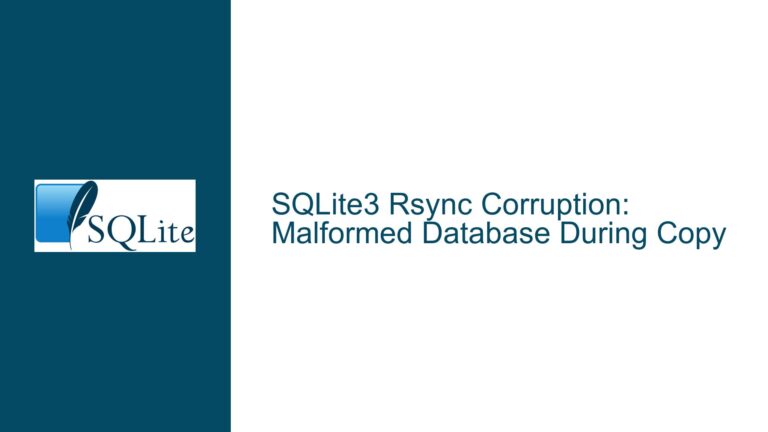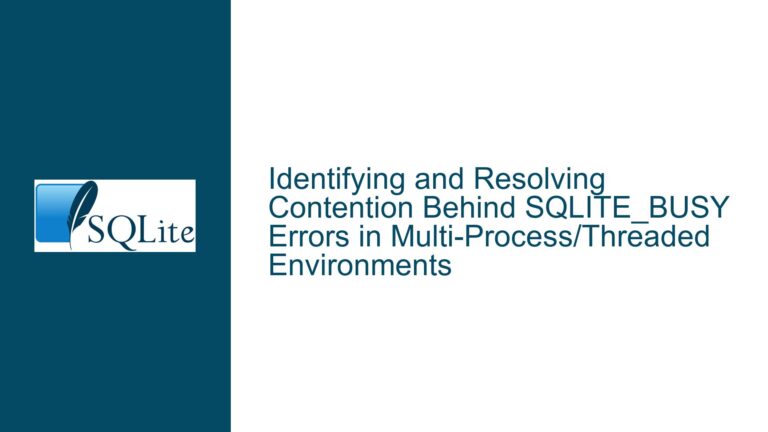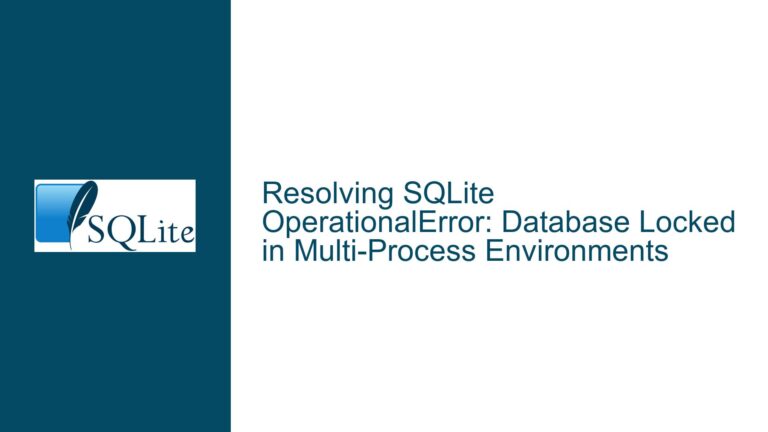Concurrent SELECT Operations on Shared SQLite Connection in Multi-Threaded Environments
Understanding Thread Safety Challenges in Shared Connection Scenarios
When working with SQLite in multi-threaded environments, developers frequently encounter nuanced challenges related to connection handling and statement execution. A common scenario involves sharing a single database connection across multiple threads attempting to perform concurrent SELECT operations. This practice raises critical questions about thread safety guarantees, transaction isolation levels, and resource management within SQLite’s architecture.
SQLite operates under specific threading modes dictated by compile-time configurations like SQLITE_THREADSAFE=1 (serialized mode), which enables safe concurrent access through internal mutexes. However, this does not automatically make application code thread-safe when sharing connections. The interaction between prepared statements (sqlite3_stmt), connection handles (sqlite3*), and transaction boundaries creates complex dependencies that require explicit management. For example, two threads using the same connection handle to prepare and execute SELECT statements risk statement handle collisions, transaction state conflicts, and memory synchronization issues, even when operating in serialized mode.
The core problem manifests when threads attempt to share both the connection object and derived statement objects without proper synchronization. While SQLite’s internal locking prevents database corruption, application-level race conditions may still occur in result set processing, transaction state transitions, and memory management of prepared statements. These issues become particularly acute when combining implicit transactions (auto-commit mode) with explicit BEGIN/COMMIT blocks across threads.
Key Vulnerabilities in Multi-Threaded Connection Handling
Four primary factors contribute to instability in shared-connection concurrency models:
1. Shared Statement Handle Contention
Prepared statements (sqlite3_stmt) are inherently tied to their parent connection handle. When multiple threads share a single connection, simultaneous calls to sqlite3_prepare_v2() and sqlite3_step() create overlapping lifecycles for statement handles. Consider this execution sequence:
Thread A
sqlite3_prepare_v2(db, "SELECT name FROM t_person", -1, &stmt, NULL);
sqlite3_step(stmt); // Reads row 1
Thread B
sqlite3_prepare_v2(db, "SELECT age FROM t_person", -1, &stmt, NULL);
sqlite3_step(stmt); // Overwrites stmt pointer
The global stmt variable becomes a shared resource vulnerable to race conditions. Thread B’s preparation of a new statement invalidates Thread A’s statement handle, causing undefined behavior during subsequent sqlite3_step() calls. Even with SQLite’s serialized threading mode, this represents an application-level concurrency bug.
2. Transaction Scope Misalignment
Explicit transaction blocks (BEGIN/COMMIT) compound threading issues when shared across connection users:
// Thread A
sqlite3_exec(db, "BEGIN", 0, 0, 0);
sqlite3_prepare_v2(db, "SELECT * FROM t_person", -1, &stmt, NULL);
// Context switch occurs here
// Thread B
sqlite3_exec(db, "COMMIT", 0, 0, 0); // Premature commit
This sequence leaves Thread A operating on a committed transaction, violating atomicity guarantees. SQLite uses lock escalation (SHARED to RESERVED/EXCLUSIVE) during write operations, but read transactions still require careful state management across threads.
3. Memory Ownership Ambiguities
The SQLite API requires explicit lifecycle management of statement handles through sqlite3_finalize(). Shared usage patterns often lead to double-free scenarios or dangling pointers when one thread finalizes a statement while another is actively stepping through it.
4. Implicit Transaction Collisions
Auto-commit mode (SQLite’s default) starts an implicit transaction for each standalone SELECT. Concurrent implicit transactions from multiple threads on a shared connection create overlapping lock states that SQLite must reconcile through its internal mutex system, potentially leading to unexpected SQLITE_BUSY or SQLITE_LOCKED errors despite serialized threading mode.
Mitigation Strategies for Thread-Safe Concurrency
To achieve robust multi-threaded operation with SQLite, implement these proven patterns:
1. Connection-Per-Thread Isolation
// Each thread opens its own connection
void* thread_func(void* arg) {
sqlite3* local_db;
sqlite3_open("xx.db", &local_db);
// Use local_db exclusively within this thread
sqlite3_close(local_db);
return NULL;
}
This eliminates shared connection contention entirely. SQLite efficiently manages concurrent reads from multiple connections through its locking primitives and WAL (Write-Ahead Logging) mode when enabled.
2. Statement Handle Confinement
When sharing a connection is unavoidable (e.g., connection pooling scenarios), enforce strict ownership rules:
// Global connection, local statements per thread
void query_thread(sqlite3* db) {
sqlite3_stmt* local_stmt;
sqlite3_prepare_v2(db, "...", -1, &local_stmt, NULL);
// Process results
sqlite3_finalize(local_stmt); // Before thread exit
}
Each thread maintains its own statement handle lifecycle without exposing them to other threads.
3. Transaction Boundary Synchronization
Use application-level mutexes to coordinate transaction blocks across threads sharing a connection:
pthread_mutex_t tx_mutex = PTHREAD_MUTEX_INITIALIZER;
void safe_transaction(sqlite3* db) {
pthread_mutex_lock(&tx_mutex);
sqlite3_exec(db, "BEGIN", 0, 0, 0);
// Perform operations
sqlite3_exec(db, "COMMIT", 0, 0, 0);
pthread_mutex_unlock(&tx_mutex);
}
This ensures atomic transaction sequences despite concurrent access.
4. Prepared Statement Cache Optimization
For high-throughput read scenarios, leverage connection-specific statement caches:
// Thread-local storage for prepared statements
__thread sqlite3_stmt* cached_stmt;
void reuse_statement(sqlite3* db) {
if (!cached_stmt) {
sqlite3_prepare_v2(db, "...", -1, &cached_stmt, NULL);
}
sqlite3_reset(cached_stmt); // Reuse prepared statement
// Bind parameters and step
}
This minimizes preparation overhead while avoiding cross-thread interference.
5. Locking Mode Configuration
Adjust SQLite’s locking behavior via pragmas to match concurrency requirements:
PRAGMA locking_mode = NORMAL; -- Default for serialized threading
PRAGMA journal_mode = WAL; -- Enable concurrent reads/writes
WAL mode significantly improves concurrency by allowing simultaneous readers and a single writer without blocking.
6. Busy Handler Implementation
Customize retry logic for contended operations:
sqlite3_busy_handler(db, [](void* data, int attempts) -> int {
return (attempts < 5) ? 1 : 0; // Retry up to 5 times
}, NULL);
This gracefully handles transient lock conflicts in shared connection scenarios.
By systematically applying these strategies, developers can achieve safe concurrent access patterns while leveraging SQLite’s threading model effectively. The choice between connection-per-thread isolation and shared connection synchronization depends on specific performance requirements and operational constraints, with the former generally preferred for simplicity and reliability.






